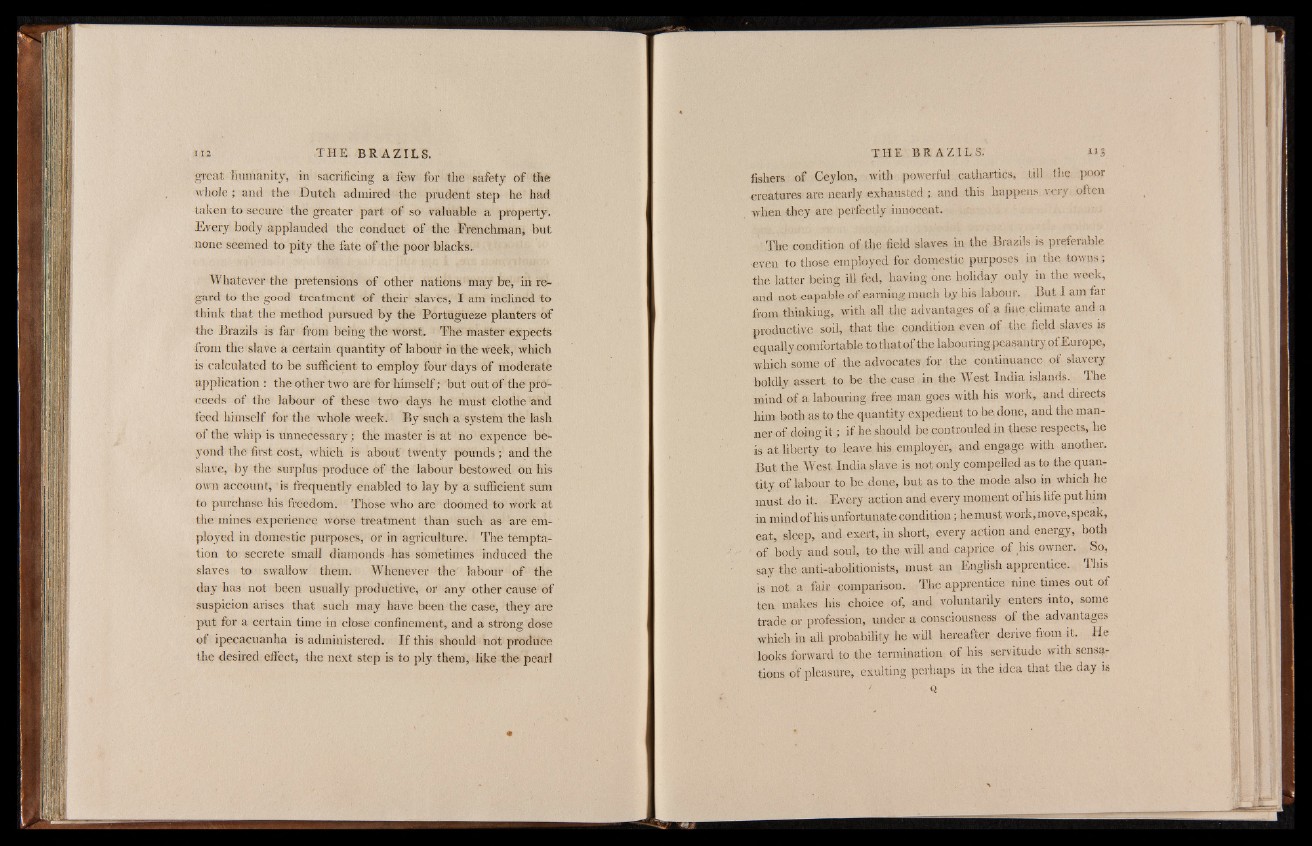
great humanity, in sacrificing a few for the safety of the
whole; and the Dutch admired the prudent step he had
taken to secure the greater part of so valuable a property.
Every body applauded the conduct of the Frenchman, but
none seemed to pity the fate of the poor blacks.
Whatever the pretensions of other nations may be, in regard
to the good treatment of their slaves, I am inclined to
think that the method pursued by the Portugueze planters of
the Brazils is far from being the worst. The master expects
from the slave a certain quantity of labour in the week, which
is calculated to be sufficient to employ four days of moderate
application : the other two are for himself; but out of the proceeds
of the labour of these two days he must clothe and
feed himself for the whole week. By such a system the lasli
of the whip is unnecessary; the master is at no expence beyond
the first cost, which is about twenty pounds; and the
slave, by the surplus produce of the labour bestowed on his
own account, is frequently enabled to lay by a sufficient sum
to purchase his freedom. Those who are doomed to work at
the mines experience worse treatment than such as are employed
in domestic purposes, or in agriculture. The temptation
to secrete small diamonds has sometimes induced the
slaves to swallow them. Whenever the' labour of the
day has not been usually productive, or any other cause of
suspicion arises that such may have been the case, they are
put for a certain time in close confinement, and a strong dose
of ipecacuanha is administered. I f this should not produce
the desired effect, the next step is to ply them, like the pearl
fishers of Ceylon, with powerful cathartics, till the poor
creatures are nearly exhausted ; and this happens very often
when they are perfectly innocent.
The condition of the field slaves in the Brazils is preferable
even to those employed for domestic purposes in the towns;
the latter being ill fed, having one holiday only in the week,
and not capable of earning much by his labour. But I am far
from thinking, with all the advantages of a fine climate and a
productive soil, that the condition even of the field slaves is
equally comfortable to tliatof the labouring peasantry of Europe,
which some of the advocates for the continuance of slavery
boldly assert to be the case in the West India islands. The
mind of a labouring free man goes with his work, and directs
him both as to the quantity expedient to be done, and the manner
of doing i t ; if he should be controuled in these respects, he
is at liberty to leave his employer, and engage with another.
But the West India slave is not only compelled as to the quantity
of labour to be done, but as to the mode also in which he
must do it. Every action and every moment of his life put him
in mind of his unfortunate condition; he must work, move, speak,
eat, sleep, and exert, in short, every action and energy, both
of body and soul, to the will and caprice of his owner. So,
say the anti-abolitionists, must an English apprentice. This
is not a fair comparison. The apprentice nine times out of
ten makes his choice of, and voluntarily enters into, some
trade or profession, under a consciousness of the advantages
which in all probability he will hereafter derive from it. He
looks forward to the termination of his servitude with sensations
of pleasure, exulting perhaps in the idea that the day is